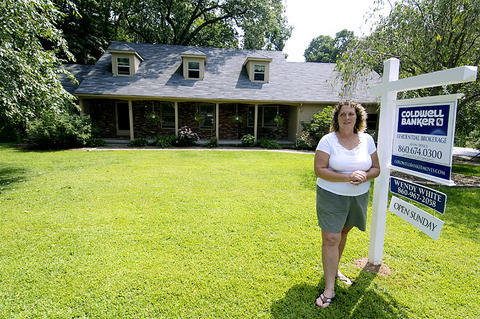The US Federal Reserve and other banking regulators issued special guidance on Tuesday urging loan service companies to work with borrowers in danger of defaulting on their home mortgages.
The new guidelines are not mandatory, but the regulators expressed the hope that companies that collect payments on mortgages would heed the advice.
Sheila Bair, chairman of the Federal Deposit Insurance Corp, said that mortgage collectors have the authority under existing accounting and tax rules to help deserving borrowers.

PHOTO: AP
"More and more consumers with subprime and hybrid mortgage products are facing the very real prospect of losing their homes through foreclosure as their payments reset and become unaffordable," she said in a statement. "It is vital that mortgage servicers work proactively with borrowers facing much higher payments as their interest rates reset."
The banking regulators' guidance issued by the Fed and the other agencies followed US President George W. Bush's announcement last Friday that his administration was putting forward proposals aimed at preventing defaults expected over the next two years as the housing industry goes through a serious downturn.
An estimated 2 million adjustable rate mortgages are scheduled to reset by the end of next year, going from low introductory interest rates to higher rates.
The problem facing many homeowners with adjustable-rate mortgages is that those mortgages are now resetting at higher interest rates that in some cases are causing their monthly payments to double or even triple.
The guidelines were aimed at addressing the fact that in many cases the company in charge of collecting monthly mortgage payments is not the same company that originated the loan.
The guidance said that appropriate strategies to ward off defaults could include modifying the terms of the loan or deferring payments. Those modifications could include converting the loan from an adjustable rate loan, one in which the interest rate resets at periodic intervals, to a fixed-rate mortgage, which would keep the monthly payments from going higher.
Other possible modifications would include extending the length of the loan and rolling the amount of payments that the borrower has missed into the total loan amount that must be paid off.
"Reworking these loans will achieve long-term sustainable obligations to provide stability to borrowers, investors and the marketplace," Bair said.
The statement also encouraged the mortgage servicing companies to consider referring borrowers in trouble to qualified homeownership counseling services.
Fed Governor Randall Kroszner said that the joint guidance was meant to encourage the companies that collect payments on mortgages packaged into certain debt securities and sold in debt markets to "reach out to financially stressed homeowners."
"Keeping families in their homes is a matter of great importance to the Federal Reserve," Kroszner said.

MORE VISITORS: The Tourism Administration said that it is seeing positive prospects in its efforts to expand the tourism market in North America and Europe Taiwan has been ranked as the cheapest place in the world to travel to this year, based on a list recommended by NerdWallet. The San Francisco-based personal finance company said that Taiwan topped the list of 16 nations it chose for budget travelers because US tourists do not need visas and travelers can easily have a good meal for less than US$10. A bus ride in Taipei costs just under US$0.50, while subway rides start at US$0.60, the firm said, adding that public transportation in Taiwan is easy to navigate. The firm also called Taiwan a “food lover’s paradise,” citing inexpensive breakfast stalls

TRADE: A mandatory declaration of origin for manufactured goods bound for the US is to take effect on May 7 to block China from exploiting Taiwan’s trade channels All products manufactured in Taiwan and exported to the US must include a signed declaration of origin starting on May 7, the Bureau of Foreign Trade announced yesterday. US President Donald Trump on April 2 imposed a 32 percent tariff on imports from Taiwan, but one week later announced a 90-day pause on its implementation. However, a universal 10 percent tariff was immediately applied to most imports from around the world. On April 12, the Trump administration further exempted computers, smartphones and semiconductors from the new tariffs. In response, President William Lai’s (賴清德) administration has introduced a series of countermeasures to support affected

CROSS-STRAIT: The vast majority of Taiwanese support maintaining the ‘status quo,’ while concern is rising about Beijing’s influence operations More than eight out of 10 Taiwanese reject Beijing’s “one country, two systems” framework for cross-strait relations, according to a survey released by the Mainland Affairs Council (MAC) on Thursday. The MAC’s latest quarterly survey found that 84.4 percent of respondents opposed Beijing’s “one country, two systems” formula for handling cross-strait relations — a figure consistent with past polling. Over the past three years, opposition to the framework has remained high, ranging from a low of 83.6 percent in April 2023 to a peak of 89.6 percent in April last year. In the most recent poll, 82.5 percent also rejected China’s

PLUGGING HOLES: The amendments would bring the legislation in line with systems found in other countries such as Japan and the US, Legislator Chen Kuan-ting said Democratic Progressive Party (DPP) Legislator Chen Kuan-ting (陳冠廷) has proposed amending national security legislation amid a spate of espionage cases. Potential gaps in security vetting procedures for personnel with access to sensitive information prompted him to propose the amendments, which would introduce changes to Article 14 of the Classified National Security Information Protection Act (國家機密保護法), Chen said yesterday. The proposal, which aims to enhance interagency vetting procedures and reduce the risk of classified information leaks, would establish a comprehensive security clearance system in Taiwan, he said. The amendment would require character and loyalty checks for civil servants and intelligence personnel prior to